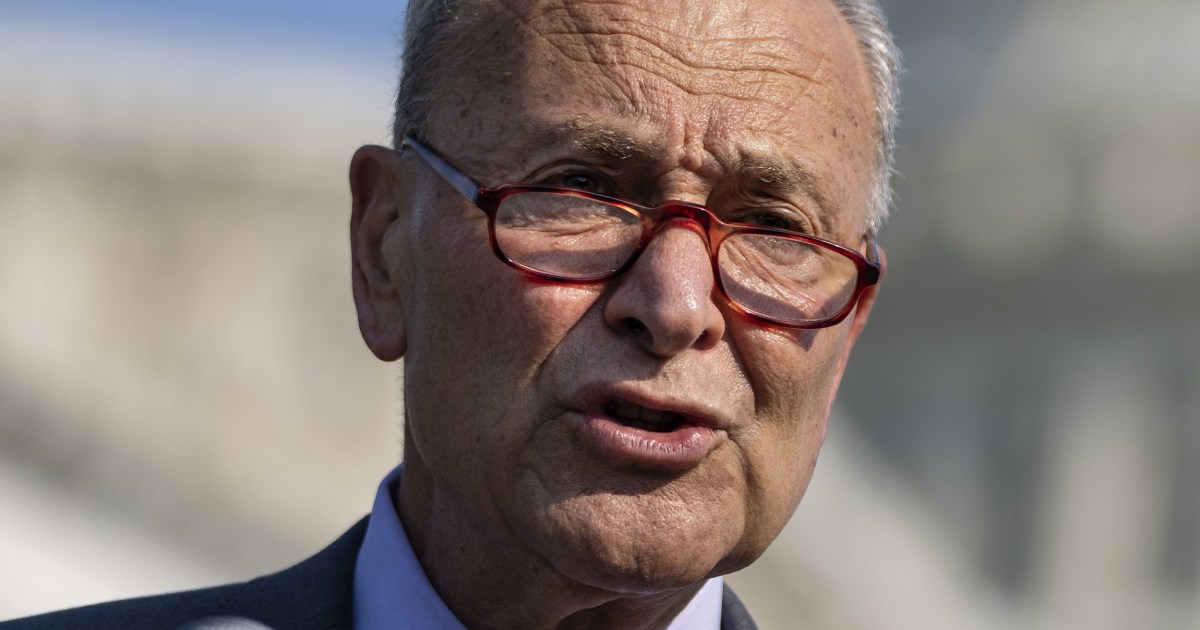
WASHINGTON — Frustrated Senate Democrats are working with the Biden administration to crank up the speed for confirmation of key diplomatic positions that have been blocked by a pair of Senate Republicans.
With more than 80 Biden State Department nominees awaiting confirmation and a paltry 15 confirmed so far, high-level vacancies are becoming more and more conspicuous as the administration enters its eighth month in office. Dozens of would-be ambassadors, special envoys and assistant secretaries are among those unable to start work until the Senate acts.
On Thursday, Senate Majority Leader Chuck Schumer threatened to keep the chamber in session for late night and potentially weekend sessions. He accused the two Republicans of “deliberately making the American people less safe in a vain and futile effort to enhance their political fortunes.”
“This chamber under this leadership is not going to tolerate a few members who want to muck up the confirmation process to make a scene,” Schumer, D-N.Y., said as he teed up votes on seven delayed State Department nominees.
Sens. Josh Hawley, R-Mo., and Ted Cruz, R-Texas, have been using the power granted to all individual senators to slow down confirmations to try to force President Joe Biden’s hand on national security.
Cruz for months has put a hold on all State Department nominees until the administration imposes certain sanctions over Russia’s building of the Nord Stream 2 pipeline. Hawley, in an even more sweeping demand, last week announced he’d hold up all State Department and Pentagon nominees until Secretary of State Antony Blinken, Defense Secretary Lloyd Austin and national security adviser Jake Sullivan all resigned.
“Leaders take responsibility for their failures,” Hawley said on the Senate floor, citing the Biden administration’s messy exit from Afghanistan. “There must be a new start.”
Getting Republican cooperation in approving the roughly 1,200 Senate-confirmed positions throughout the federal government has been a broad challenge for the Biden administration and its predecessors.
Over the years, the average confirmation time doubled between the Reagan administration and the Trump administration, according to the non-partisan Partnership for Public Service.
“This is not just an inside baseball question,” said Max Stier, CEO of the Partnership for Public Service. “These are the people that are actually supposed to be dealing with our most important challenges as a country, from the withdrawal from Afghanistan to getting out rental assistance people who are economically in trouble to dealing with the pandemic to climate change.”
Yet the problem is particularly acute at the State Department, which has more Senate-confirmed political appointees than any other — nearly 150 more than the Defense Department. So far, the Senate has confirmed only two of Biden’s nominees to serve as U.S. ambassadors.
Individual senators like Hawley and Cruz can’t permanently block a nominee. But they can use Senate rules to force procedural steps that are skipped when all senators agree, but take days to complete if anyone objects.
“What they are doing is pouring sand in the machine, but it is still possible to move folks forward,” Stier said. “You have to eat up a lot of your clock, and there are a lot of other competing interests in attempting to do that, including other nominees.”
Both potential 2024 presidential candidates, Hawley and Cruz have worked to beef up their foreign policy credentials while serving as vocal counterweights to Biden’s foreign policy agenda.
In a statement to NBC News, Hawley said he was seeking accountability for “Biden’s botched Afghanistan withdrawal that killed 13 American service members and left hundreds of Americans stranded.”
“Democrats might think accountability is a ‘waste of time,’ but they’re wrong. They’ve got a lot to answer for and this is the least we can do,” Hawley said.
Cruz’s office didn’t immediately respond to a request for comment.
Of the more than 80 State Department nominees awaiting confirmation, more than 60 have already gotten through the first step: approval by the Senate Foreign Relations Committee, according to records provided by the State Department. Many were approved unanimously, meaning no Republicans objected at the committee level.
The vacancies have been a source of increasing frustration at the State Department, within the White House and among U.S. diplomats, many of whom say they leave the U.S. government conducting high-stakes diplomacy with one hand tied behind its back.
“For our national security, I respectfully urge the Senate and this committee to move as swiftly as possible to consider and confirm all pending nominees and to address what is a significant disruption in our national security policymaking,” Blinken told the Senate Foreign Relations Committee this month.
The vacancies have already had real-world effects. When the U.S. began its hectic withdrawal from Afghanistan, there was no Senate-confirmed ambassador to the country where it had been at war for two decades, with the Embassy in Kabul instead relying on a former foreign service officer called in from retirement to lead the mission. The senior position overseeing that region of Asia was also vacant.
When the Taliban took over Kabul in August, longtime U.S. diplomat John Bass was in the middle of teaching a class for future ambassadors at the department’s Foreign Service Institute when he learned he was being sent immediately to Kabul. Bass, who had served as ambassador to Afghanistan once before, left mid-lecture to prepare to head to Kabul to assist with the evacuation, a person with knowledge of the event said.
Last week the American Foreign Service Association, the predominant labor union representing US diplomats, said it would ramp up calls to address “the over-politicization of the processes” of confirming foreign policy professionals.
“The delays are no longer an inconvenience — they are becoming a threat to our national security,” the diplomats’ union said.
While the Biden administration’s troubles getting diplomats confirmed reflects a growing partisan stalemate in Congress, this isn’t the first time vacant positions have weighed on national security.
The bipartisan 9/11 Commission found that on the day of the 2001 terrorist attacks, only 57 percent of the top 123 Senate-confirmed positions were filled at the Pentagon, the Justice Department and the State Department combined, excluding ambassadors, U.S. marshals and attorneys. The report warned that in addition to the delays caused by the prolonged election, the slow Senate confirmation process had left the United States vulnerable.
Source: | This article originally belongs to Nbcnews.com









